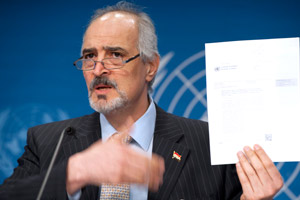Q: Was the exclusion of Iran from the Syria peace talks taking place in Montreux, Switzerland inevitable? What are some possible implications?

Bashar Ja’afari, Permanent Representative of the Syrian Arab Republic to the United Nations, speaks to the media during the Geneva II Conference on Syria, in Montreux, Switzerland. Photo: UN.
John Duke Anthony: The exclusion of Iran may be the price the conference conveners believe they had to pay to have any talks at all in keeping with the advance hype about there being a January meeting. I believe the rebel groups we want represented would have gone under any circumstances. Certainly the price for their not doing so would have been high, perhaps prohibitively so. The global image of their being irresponsible and refusing to engage in the give and take of discussion, debate, and negotiations may well have proved ruinous. It would have practically guaranteed that the Syrian government’s image would correspondingly improve, as indeed would Iran’s, Russia’s, and everybody else’s. In an echo of Shakespeare’s “Beware the wrath of a rejected suitor” and “Hell hath no fury like a woman scorned,” Iran, having been provoked, antagonized, and told to stay home, will be tempted to extract a price for being excluded. By leaving no fingerprints — so as not to add further fuel to American Congressional threats to increase the sanctions against Iran — Tehran could instigate here or there, and possibly here and there, violent attacks or other harm to American and/or other prominent conference attendees’ interests by groups or individuals it controls.
For Reference:
“Excluded Iran Says Its Role at Talks on Syria Will Be Missed” – The New York Times, January 21, 2014
 National Council on U.S.-Arab Relations Founding President & CEO Dr. John Duke Anthony periodically responds to questions posed by friends of the National Council for the Arabia, the Gulf, and the GCC Blog. Find Dr. Anthony’s full biography here and read more from Dr. Anthony here.
National Council on U.S.-Arab Relations Founding President & CEO Dr. John Duke Anthony periodically responds to questions posed by friends of the National Council for the Arabia, the Gulf, and the GCC Blog. Find Dr. Anthony’s full biography here and read more from Dr. Anthony here.



You must be logged in to post a comment.